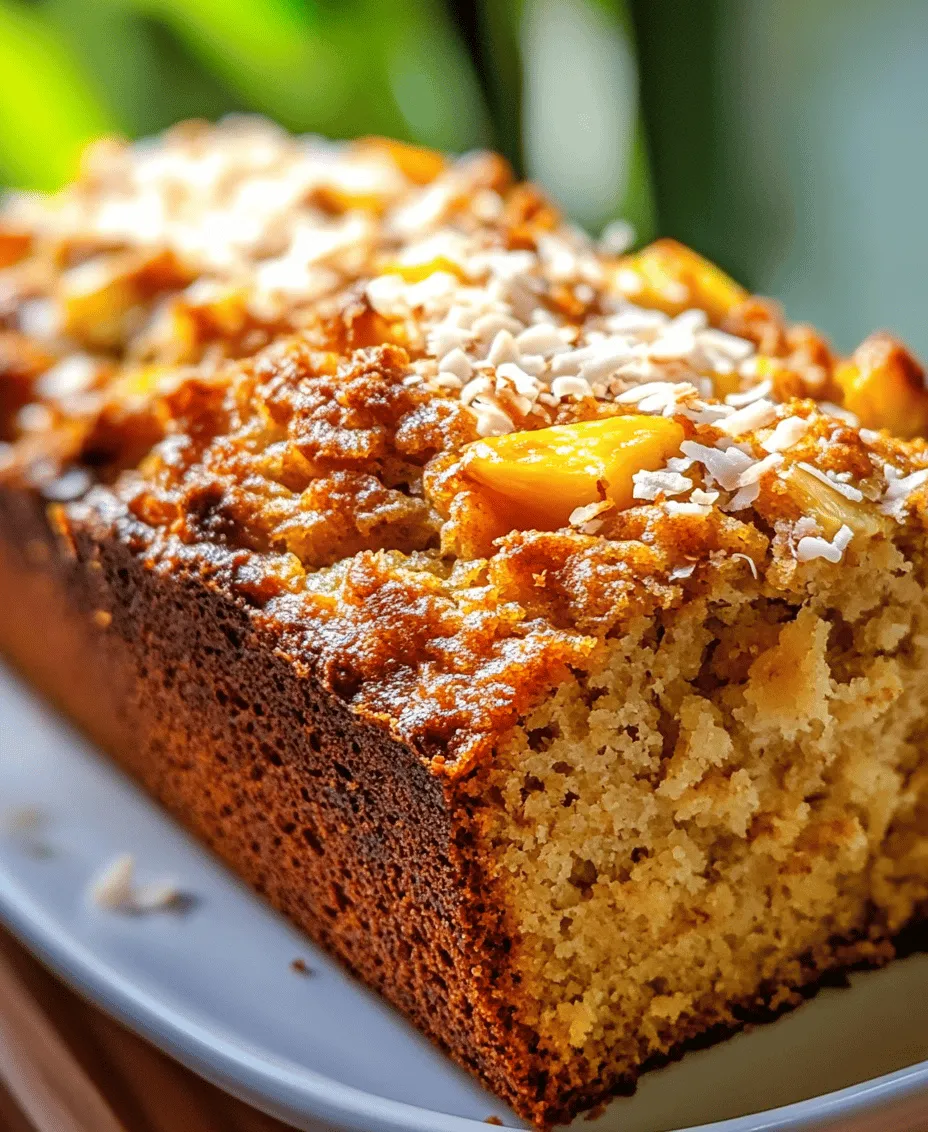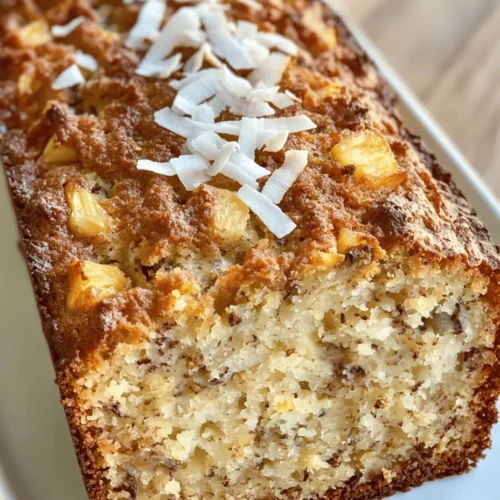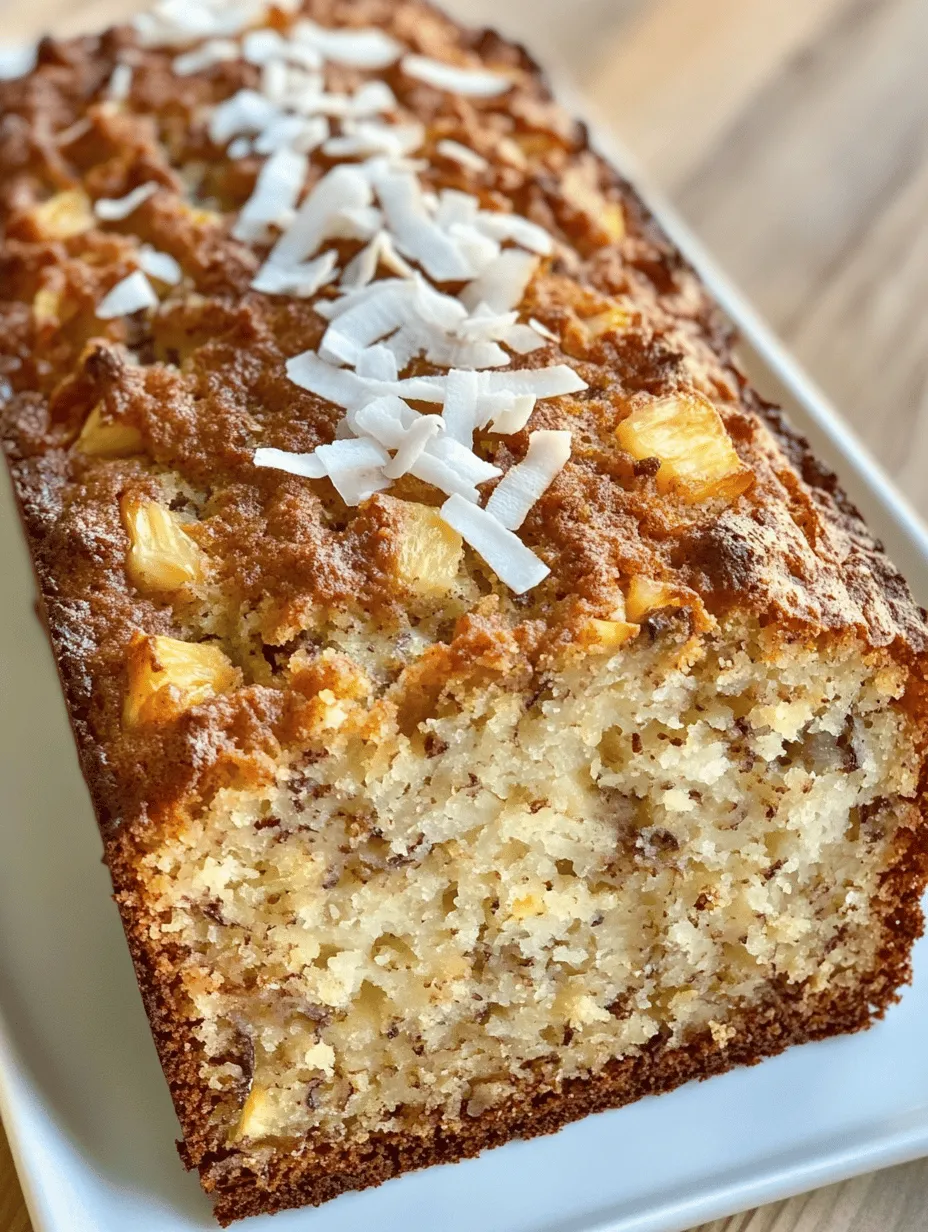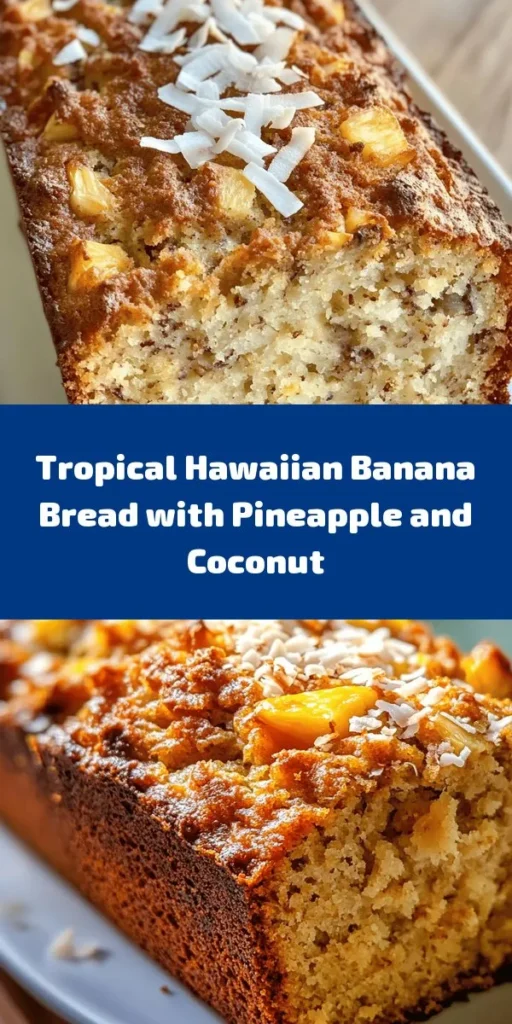Introduction
Imagine a slice of warm, moist banana bread infused with the vibrant flavors of the tropics. This is exactly what you get with our Hawaiian Banana Bread featuring pineapple and coconut. Inspired by the lush, tropical landscapes of Hawaii, this recipe celebrates the sweet and tangy notes of fresh fruits, delivering a delightful treat that transports your taste buds straight to a sun-soaked beach.
Banana bread has long been a beloved staple in kitchens around the world, renowned for its versatility. It serves as a breakfast option, a snack, or even a dessert. The beauty of banana bread lies in its adaptability; you can easily customize it with various flavors and ingredients. In this tropical version, we elevate the classic recipe by adding crushed pineapple and shredded coconut, creating a harmonious blend that is both comforting and refreshing.
The key ingredients in this recipe—ripe bananas, juicy pineapple, and rich coconut—bring together a delightful medley of tropical flavors. Each component plays a crucial role, not only enhancing the taste but also contributing to the luscious texture that makes this banana bread so irresistible.
The Allure of Tropical Ingredients
Flavor Profiles
The trio of bananas, pineapple, and coconut creates a symphony of flavors that tantalize the palate. Ripe bananas add a natural sweetness and a soft, moist texture, acting as the base of the bread. Their delightful flavor enhances the overall taste and provides a comforting foundation.
Pineapple introduces a burst of tanginess, cutting through the sweetness of the bananas. This tropical fruit is juicy and vibrant, enriching the bread with its unique taste. As the bread bakes, the pineapple’s natural sugars caramelize, resulting in a deliciously sweet and slightly tart flavor profile that complements the bananas beautifully.
Coconut, with its tropical aroma and rich texture, adds a layer of complexity to the bread. Whether you choose shredded coconut or coconut milk, the nutty flavor enhances the overall experience and provides a taste of the tropics with every bite.
Health Benefits
Beyond their deliciousness, these ingredients boast several health benefits. Bananas are a great source of potassium, an essential mineral that helps maintain heart health and regulate blood pressure. They also contain dietary fiber, which supports digestive health and provides a feeling of fullness.
Pineapple is known for its digestive benefits, thanks to an enzyme called bromelain. This powerful enzyme helps break down proteins, making it easier for the body to digest food. Additionally, pineapple is rich in vitamin C, an antioxidant that supports the immune system and promotes healthy skin.
Coconut is celebrated for its healthy fats, particularly medium-chain triglycerides (MCTs), which are easily absorbed and utilized by the body for energy. These fats can provide a quick source of fuel, making coconut a great addition to your diet when consumed in moderation.
When combined, these ingredients not only tantalize your taste buds but also provide a nourishing experience that makes this banana bread a guilt-free indulgence.
Why They Work Well Together
The magic of this Hawaiian banana bread lies in how these ingredients complement one another. The sweetness of the bananas balances the acidity of the pineapple, while the coconut provides a creamy richness that ties everything together. Together, they create a delightful texture that is moist yet tender, with the pineapple adding a unique twist that keeps each bite exciting.
When these tropical flavors meld during the baking process, they create an intoxicating aroma that fills your kitchen, setting the stage for an unforgettable treat.
A Step-by-Step Guide to Tropical Hawaiian Banana Bread
Before diving into the recipe, it’s important to understand the preparation and baking times. This Hawaiian banana bread is simple to prepare, requiring about 15 minutes of prep time and approximately 60 minutes in the oven, making it a perfect choice for busy mornings or leisurely weekends.
To achieve the best results, the quality of your ingredients is paramount. Using ripe bananas, fresh pineapple, and high-quality coconut will elevate your banana bread, resulting in a moist, flavorful loaf that you’ll want to share with family and friends.
Gathering Your Ingredients
Now that you’re inspired to create this tropical delight, let’s dive into the ingredients you’ll need for this Hawaiian banana bread. Each component is essential for achieving the perfect balance of flavor and texture.
Ripe Bananas
The first and foremost ingredient in this recipe is ripe bananas. Choosing the right bananas is crucial for the best results. Look for bananas that are heavily speckled with brown spots, as this indicates increased sweetness and optimal ripeness. Overripe bananas not only provide a richer flavor but also contribute to the bread’s moistness.
If you have bananas that are not quite ripe, you can speed up the ripening process by placing them in a brown paper bag at room temperature. This traps the ethylene gas they emit, helping them ripen faster.
Crushed Pineapple
Next up is crushed pineapple. You have the option of using either fresh or canned pineapple, but there are some key differences to consider. Fresh pineapple will provide a brighter flavor, while canned pineapple is convenient and often sweeter due to added sugars. If you choose canned pineapple, look for options packed in juice rather than syrup to avoid excess sweetness.
If you opt for fresh pineapple, simply peel, core, and chop it into small pieces before crushing. This will ensure that the pineapple mixes evenly throughout the batter and infuses the bread with its delightful flavor.
Shredded Coconut
Shredded coconut is another essential ingredient that adds a wonderful texture and flavor to the banana bread. When selecting shredded coconut, you can choose between sweetened and unsweetened varieties.
Sweetened shredded coconut will impart additional sweetness to the bread, while unsweetened coconut offers a more subtle coconut flavor without the extra sugar. Depending on your preference, you can choose one or the other, but keep in mind that the overall sweetness of the bread may vary based on your choice.
Sugars
In this recipe, we will use both granulated sugar and brown sugar. Granulated sugar provides a straightforward sweetness, while brown sugar enhances the flavor with its rich molasses undertones. The combination creates a delightful balance, helping to achieve a moist loaf with a tender crumb.
Adjusting the ratio of these sugars allows you to customize the sweetness to your liking. For a sweeter bread, feel free to increase the amount of brown sugar, but be cautious, as too much can affect the texture.
Nuts (Optional)
Lastly, nuts are an optional addition that can elevate your Hawaiian banana bread. Walnuts or macadamia nuts add a delightful crunch and a nutty flavor that pairs beautifully with the tropical ingredients. If you decide to include nuts, chop them coarsely and fold them into the batter just before transferring it to the baking pan.
Gather these ingredients, and you’re ready to embark on the journey of crafting your very own Tropical Hawaiian Banana Bread! With each step, you’ll be one step closer to enjoying a delectable treat that captures the essence of the tropics.
Stay tuned as we explore the step-by-step instructions for preparing this delightful banana bread in the next section!

Preparation Steps Explained
Preheating the Oven: Importance of Achieving the Right Temperature
Preheating your oven is a crucial first step in the baking process, especially for our Hawaiian Banana Bread with Pineapple and Coconut. This ensures that your ingredients react properly and bake evenly. A well-preheated oven allows the baking soda and baking powder to activate immediately when the batter hits the hot surface, helping the bread rise effectively. Set your oven to 350°F (175°C) and allow it to heat for at least 15-20 minutes before placing your batter inside.
Mixing Wet Ingredients: Tips for Ensuring a Smooth Mixture
In a large mixing bowl, start by mashing your ripe bananas. The more overripe they are, the sweeter and more flavorful your banana bread will be. Once mashed, add the eggs, melted butter, and vanilla extract. To achieve a smooth mixture, use a whisk or a fork to blend everything together thoroughly. Make sure there are no lumps of butter or banana left untouched. This step is crucial as it ensures that the moisture is evenly distributed throughout the batter, leading to a moist and tender bread.
Combining Dry Ingredients: The Science Behind Proper Mixing Techniques
In a separate bowl, whisk together the dry ingredients: flour, baking soda, baking powder, and salt. Whisking helps to aerate the flour and evenly distribute the leavening agents, which is essential for proper rising. When you combine the wet and dry ingredients, do it gently. Overmixing can lead to a dense loaf, as gluten develops too much. Aim for just combined; a few small lumps are perfectly fine. This approach ensures your Hawaiian Banana Bread remains light and fluffy.
Folding in Nuts and Coconut: Best Practices for Incorporating Additional Ingredients
Finally, it’s time to fold in the chopped macadamia nuts and shredded coconut. Use a spatula and carefully lift the batter from the bottom of the bowl, allowing the mixture to fall back over itself. This gentle folding technique incorporates the nuts and coconut without deflating the batter. The macadamia nuts add a delightful crunch, while the coconut infuses that tropical flavor we crave in this recipe.
Baking the Perfect Banana Bread
Pouring and Smoothing the Batter: Techniques for an Even Loaf
Once your batter is mixed, pour it into a greased loaf pan. Use a rubber spatula to scrape every last bit of batter from the bowl, ensuring none of the mixture goes to waste. Smooth the top with the spatula to create an even surface, which helps the bread to rise uniformly. An even top not only looks appealing but also ensures that the bread bakes evenly throughout.
Baking Time and Doneness Indicators: What to Look for to Ensure Perfect Baking
Place the loaf pan in your preheated oven and bake for about 55-65 minutes. Keep an eye on it during the last 10 minutes of baking. The bread is done when the top is golden brown and a toothpick inserted into the center comes out clean or with only a few crumbs attached. If the top begins to brown too quickly, you can loosely cover it with aluminum foil to prevent burning while the inside continues to bake.
Cooling Process: Why Cooling is Essential and How it Affects Texture
Once baked, remove the banana bread from the oven and let it cool in the pan for about 10-15 minutes. This resting period allows the bread to firm up, making it easier to slice. Afterward, transfer it to a wire rack to cool completely. Cooling is essential as it helps preserve the bread’s moisture and texture. Slicing into hot banana bread can lead to a gummy texture, so patience is key!
Serving Suggestions and Pairings
Ideas for Enjoying the Banana Bread: Warm with Butter, Cream Cheese, or as a Breakfast Option
Hawaiian Banana Bread is a versatile treat that can be enjoyed any time of the day. Serve it warm, spread with a generous pat of butter for a comforting breakfast or snack. Alternatively, cream cheese adds a delightful tang that complements the sweetness of the bread beautifully. For a tropical breakfast, consider pairing it with fresh fruit or yogurt. The options are endless, and it’s sure to become a favorite in your household.
Pairing Drinks: Suggested Beverages that Complement the Tropical Flavors
To elevate your banana bread experience, consider pairing it with drinks that enhance its tropical flavors. A cup of freshly brewed coffee offers a delightful contrast, while herbal teas can provide a soothing balance. For a more tropical twist, serve it alongside fresh fruit juices, such as pineapple or orange juice, which can brighten up the flavors and enhance the overall experience.
Storage Tips for Freshness
Best Practices for Storing Banana Bread: Room Temperature vs. Refrigeration
To keep your Hawaiian Banana Bread fresh, store it in an airtight container at room temperature for up to four days. If you live in a particularly humid area, refrigeration can help prolong its shelf life, although this may dry it out slightly. Wrap the bread tightly in plastic wrap or aluminum foil before placing it in the fridge to minimize moisture loss.
How to Freeze Banana Bread for Longer Storage: Steps and Tips
If you want to enjoy your banana bread later, freezing is an excellent option. Allow the bread to cool completely, then wrap it tightly in plastic wrap followed by aluminum foil to ensure no air gets in. This dual-layer protection helps prevent freezer burn. Label it with the date, and it can be stored in the freezer for up to three months. When you’re ready to enjoy it, simply thaw it in the refrigerator overnight or allow it to sit at room temperature for a few hours. You can also warm individual slices in the microwave for a quick treat.
Conclusion
Hawaiian Banana Bread with Pineapple and Coconut captures the essence of tropical flavors in a moist, delicious loaf. Its unique combination of ripe bananas, sweet pineapple, and crunchy macadamia nuts creates a delightful experience for the palate. We encourage you to experiment with variations of this recipe—try adding chocolate chips, swapping different nuts, or incorporating spices like cinnamon or nutmeg for an extra flavor punch.
The joy of baking goes beyond just creating a delicious treat; it’s about sharing those moments with loved ones. This banana bread is perfect for gatherings, breakfast, or simply as a snack to brighten your day. So gather your ingredients, fire up your oven, and enjoy the delightful experience of baking and sharing this Hawaiian-inspired delight. Happy baking!



